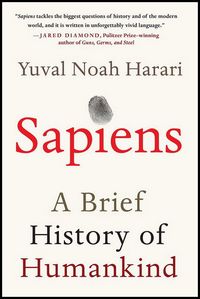

Well, old habits die hard.Īnd they didn't stop there. Sapiens were responsible for the extinction of several species and extinguished megafaunas in Australia and America. While exploring other continents, they also destroyed them. The cognitive ability of homo sapiens was enough to develop skills that other species were not capable of, such as organizing themselves in small groups, go hunting, or exchange tools.įrom there, they spread beyond Africa. It turns out that several advantages led sapiens to be the leader of their kind. The homo sapiens forced the extinction of others, through slaughter and cannibalism.The homo sapiens DNA mixed with the DNA from other species until they became what we are today.There are two theories addressed by author Yuval Noah Harari, which attempt to explain this event:

Among them, other types of humans lived around the world, such as homo neanderthalensis and homo erectus (which survived for almost 1.5 million years).īut somehow, homo sapiens stood out from the rest, spread and today thrives. However, sapiens was not the only existing species.

And the projection, seen from the ambition of homo sapiens, is increasingly expanding.Ībout 200 thousand years ago, homo sapiens ( "wise man") appeared in East Africa. We human beings were able to lead Earth in a short time (if we think about the age of the planet).
#YUVAL NOAH HARARI SAPIENS PDF PDF#
New technologies have accelerated advances considerably.ĭownload the "Sapiens: A Brief History of Humankind" Book Summary in PDF for freeĭo you have no time to read now? Then download the free PDF and read wherever and whenever you want:. Scientific advances caused humanity to believe more in their abilities. Money and religion were forms of standardization and globalization among people around the world, but also to establish laws and authority over society. The Agricultural Revolution expanded the exchange "market" and reduced the need for nomadic life. Homo sapiens stood out from other human species for their cognitive ability, being able to establish interpersonal connections and improve primitive skills. Main ideas of the book "Sapiens: A Brief History of Humankind" "Sapiens" is ideal for historians, anthropologists, students, and people interested in the subject who seek to understand the evolution of the human being and society over time. Today, Professor Harari travels around the world giving lectures on subjects that have been discussed in his books and offers his knowledge to a lot of organizations and audiences voluntarily. He has also written for major newspapers like The Guardian, The Financial Times, and The Wall Street Journal. Twice winner of the Polonsky Prize for Creativity and Originality (20), Yuval Harari has already given a speech on the future of humanity at the World Economic Forum in Davos. Yuval Noah Harari was born in 1976, in Israel, and he is a professor at the Department of History of The Hebrew University of Jerusalem. Throughout its 464 pages, the book retells the history of human beings from a new perspective and brings reflections on our behavior, evolution, and leadership. Harari's work has already been translated into almost 50 languages and has been named one of The Sunday Times' top bestsellers, making it into the Top 10 New York Times bestsellers. The book "Sapiens: A Brief History of Humankind" was first published in 2011 and, since then, it is a great success, with more than 10 million copies sold around the world. Want to know more? Then read on and discover the history of humanity from an innovative perspective! About the book "Sapiens: A Brief History of Humankind" This PocketBook proposes you to reflect on your existence, telling how our species got organized until we became a globalized society in the 21st century and the factors associated with it. The book "Sapiens", by Yuval Noah Harari, narrates the human trajectory, from the Stone Age, the emergence of homo sapiens, development of cognitive capacity, the birth of money and human rights, to the present day, explaining the importance of scientific advances for society. Português English Español Français Italiano Alemão Russo Mandarim







 0 kommentar(er)
0 kommentar(er)
